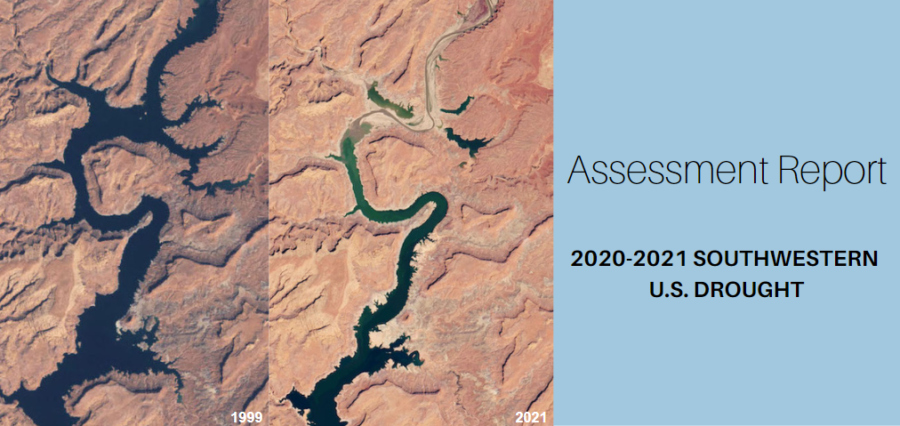Will Lake Powell Run Completely Dry?
Over 22 years, Lake Powell has been severely affected by the southwestern U.S. drought.
September 23, 2022
Due to a megadrought that has affected the southwestern U.S for several years, Lake Powell is quickly drying up. This severe drought will likely continue for many more years, possibly leaving Lake Powell empty. Scientists credit this drought to the “low precipitations and harsh temperatures” (Climate Program Office). The U.S. has faced several droughts, but this is the driest this region has been in almost 1,000 years. As the region quickly begins to disappear, Drought Task Forces and Colorado officials are thinking of quick temporary solutions to help slow down this pattern. This dramatic change raises a question. “What will happen if Lake Powell completely disappears?”
Lake Powell is an artificial reservoir created between the border of Utah and Arizona. Over the past two years, the water levels have significantly dropped. It was recently measured at 3,534.51 feet above sea level and will reach deadpool levels at 3,490 feet (Newsweek). Not only is this lake a popular attraction site, but it also provides cheap energy to the surrounding region. The dam’s water flows to power hydroelectric power. If the lake dries, this will cease their flowing energy and damage generators. As a result, this could wipe out several homes and businesses in the area. Most importantly, Lake Powell provides water to almost 40 million people. With the decreasing sea levels, the water supply may halt in future years (The Guardian). Chloe Chang (10) commented, “As someone who hopes to travel in the future, it will be sad to see such a well-known location disappear.” The drying of Lake Powell could affect many others around the country because people will need to find a new source of water.
The U.S Department of Interior released its plan to resolve the drought issue in Lake Powell. As the sea levels are severely low, they hope that it doesn’t go lower than that. They also plan to limit the water released from the lake. This means limiting the water supply and energy produced by the lake. As a temporary solution, the U.S Bureau of Reclamation requests that involved states limit their water supply. However, arguments have risen over the use and conservation of water, slowing down any progress to save Lake Powell. Some argue that the agricultural industry has drained the water supply, while others believe it’s due to city consumption. Without any progress and conflicts arising, the water levels will most likely continue to decrease. Regional states affected by Lake Powell have been reluctant to cut their water use and supply.
If nothing can be done to stop this drought, Lake Powell will become completely dry. Cities relying on the lake for their water supply must find other places to get their water source, affecting the whole country. In future years, a popular tourist site may become an empty land space.






































